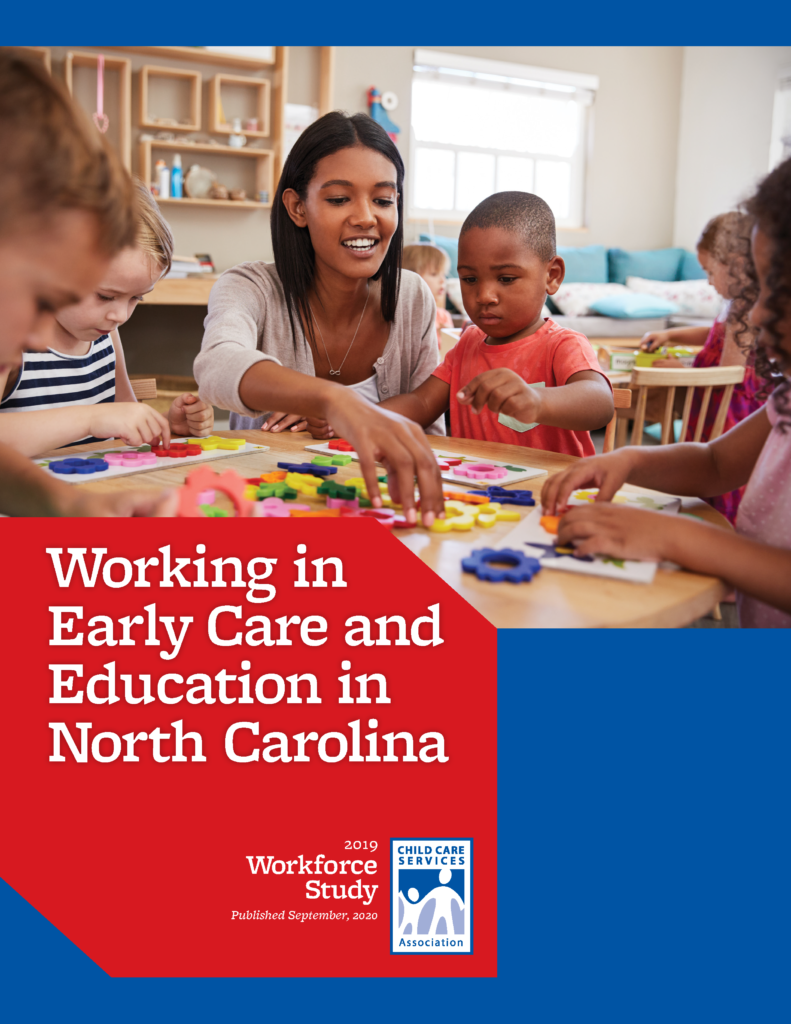FOR IMMEDIATE RELEASE
MEDIA CONTACT
Jennifer Gioia
919-578-1593
jenniferg@childcareservices.org
CCSA Releases the 2019 North Carolina Child Care Workforce Study
The new study from CCSA gives context to the state of child care before the pandemic.
Chapel Hill, N.C., October 2, 2020: Child Care Services Association (CCSA), with funding from the North Carolina Division of Child Development and Early Education (NC DCDEE), has released the 2019 North Carolina Child Care Workforce Study. The purpose of this study is to help the State of North Carolina and local communities understand the early childhood education landscape by examining child care programs and the staff they employ. With more than 5,400 child care centers and homes serving N.C. children ages birth to 5 years old, child care providers are vital for the success of our children, our families and our economy.
The 2019 study mirrors previous studies dating back to the early 2000s, allowing both a current analysis and a look over time at how child care has changed in N.C. It also gives a thorough picture of who child care providers are in our state—largely women with at least an associate degree that make less than a living wage. Often undervalued and unrecognized, child care providers in N.C. are:
- The early care and education teaching staff averages 40 years old, nearly all female and about half people of color
- About 62 percent of the center teaching staff, 87 percent of center directors and 51 percent of family child care providers have at least an associate degree in any field
- Center teaching staff have nearly 12 years of experience in the field, while directors have about 20 years and family child care providers have more than 21 years of experience
- Statewide, the early care and education teaching staff make an average of $12.00 per hour, directors average $19.23 per hour and family child care providers average $9.09 per hour
This information was gathered from research conducted just before the COVID-19 pandemic. COVID-19 has brought to light how essential quality child care is for our economy because it allows parents to work and provides young children with building blocks for future success. Research on the economics of child care has shown that investments in quality early care and education result in substantial future savings, and research on child development points to the importance of quality child care and a competent workforce, especially for at-risk children.
Historically, North Carolina has been a national leader in the early childhood education field. Knowing where we were just before the pandemic gives us invaluable information as we plan our path forward to recoup the losses we sustained. This report is foundational to that knowledge.
You can read more and download the report at https://bit.ly/3jhT0fb. County-level reports have also been released.*
Child Care Services Association
Founded in 1974, the mission of Child Care Services Association (CCSA) is to ensure affordable, accessible, high-quality child care for all young children and their families. Using a holistic approach, CCSA supports children and families, helps child care professionals improve the quality of early education children receive and ensures all families can afford and access the high-quality early care and education that is so important for a child’s early development. Through its Meal Services Program, CCSA also provides nutritious meals to children at child care centers, where they may eat 50-100 percent of their meals. Our T.E.A.C.H. Early Childhood®, Child Care WAGE$® and Infant-Toddler Educator AWARD$ Plus® programs give child care professionals the means to obtain an education and supplement their salary based on that education. CCSA also licenses T.E.A.C.H. and WAGE$ across the U.S. and conducts early childhood systems research and policy development statewide and nationally. For more information, visit www.childcareservices.org.
*Edit: October 7, 2020
-end-



